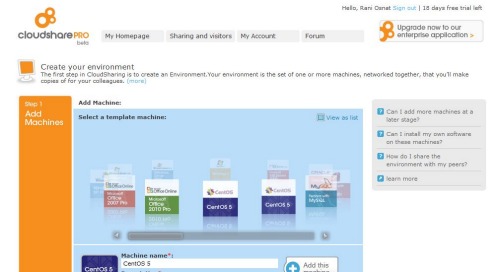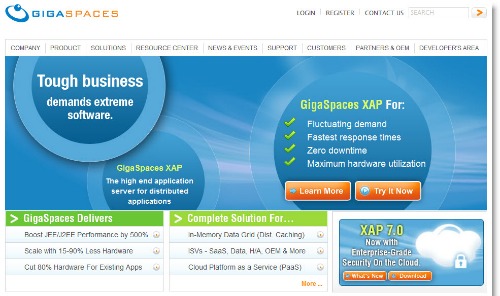As services and applications increasingly move from in-house servers to the Internet, Israeli companies are helping to seed the worldwide cloud revolution.

The computing world is going online like never before. By utilizing resources on the Internet — “cloud” — companies can avoid laying out large sums of money on IT systems. Every day, additional services and enterprise applications are accessible on reliable, secure and high-speed servers. And Israeli companies are playing a key role in this cloud revolution.
The concept of cloud computing got a big push during the recent worldwide recession, as companies sought ways to save money, Israeli cloud consultant Eddie Resnick tells ISRAEL21c.
“Companies buy for peak needs,” he says, to ensure their capacity to operate under even the most intensive conditions. But most of the time, Resnick says, as much as 85 percent of peak capacity goes unused. By moving to the cloud, companies can save significant amounts of money using just the services and resources they need at the moment without investing in infrastructure aimed at peaks.
Cloud infrastructure – the servers where the applications and services sit – is generally provided by large data companies like Amazon and Google, which have the computing capacity to handle billions of data requests.
The applications and services on those servers, however – as well as the systems that keep the data secure – are provided by a panoply of IT, Internet and software companies. Several significant ones are Israeli.
1. Commtouch
This web security company, which has been around since 1991, developed a cloud-based checksum-based filtering system called Recurrent Pattern Detection, which analyzes billions of Internet transactions each day to search for malware and spam, preventing financial and personal information from being compromised. Perhaps the world’s biggest cloud-based security company, Commtouch provides services to thousands of organizations and millions of users in 190 countries.
2. Visual Tao
The heart of cloud computing is in the cloud-based applications users can substitute for those on their desktop or local server. A good example of “software as a service” is VisualTao, formerly known as PlanPlatform and now an Israeli-based subsidiary of international graphics giant Autodesk. Its online “CAD [computer-aided design] on Demand” allows users anywhere to collaborate on graphics-heavy CAD files – a concept that just a few years ago would have been considered absurd considering how heavy and expensive CAD applications were.
3. Libox

Libox is one of several Israeli companies that have developed build-your-own-cloud technologies. Founded in 2008 by Erez Pilosof, who previously founded Israel’s Walla! web portal, Libox lets you stream and share music, photos, movies and other media files on different devices by creating private clouds linking them to your personal server. Providing a similar service is MeCanto, which streams your music from your computer to your cell phone.
4. Cloudshare

Cloudshare allows IT service providers to produce “virtual machines” for their customers, showing them how applications, business scenarios, Internet appliances, training programs and sales efforts would work – without installing anything on the client’s computers. The full online environment enables clients to save files and data on Cloudshare’s servers.

This company offers full-fledged Internet backup for all files on a computer or network, using a small device that does all the connecting, processing, syncing and storing. Ctera’s tiny CloudPlug device turns any USB drive on a main computer into a full-fledged Internet-connected backup solution. And there’s no software to install.
6. Gizmox
Navot Peled of Gizmox has developed what he believes will become the standard development platform for cloud services in the coming years. VisualWebGui is a totally open-source, in-the-cloud web application development platform, similar to – and meant as a secure replacement for — Adobe’s Flex and Microsoft’s Silverlight. In 2008, the company offered $10,000 to anyone who could successfully compromise the platform. The hacker contest ran for four months – and the prize remains unclaimed. The platform is already being used by Cisco, Sony, the US Army, the governments of Germany, Thailand and Canada, and several Israeli ministries, as well as thousands of individuals and small companies.
7. Cotendo

One of the biggest issues for any website, especially one that hosts its applications in the cloud, is speed. Customers, clients and users cannot be made to wait. Cotendo’s “CDN and Site Acceleration” speeds up delivery of content, advertisements and services by aggregating user requests through a global network of data centers. The suite also offers security, reporting and connection optimization designed to get information and services on clients’ screens quickly.

Companies that do business on the web need to draw on a host of applications in order to fulfill orders, update databases, communicate with customers and take care of finances. In the traditional model of application management, businesses would set up application, database and storage servers in-house, accounting for peak needs, which require service contracts and security. Gigaspaces offers the same services in the cloud, automatically adding capacity as demand increases. Among Gigaspaces’ customers are dozens of top businesses including Nortel, Sears Holdings, Virgin Mobile and Dow Jones.
And this isn’t the whole Israel cloud story – not by a long shot. Other veteran players and fledgling startups are now building the applications and services that will make the transition to the cloud simpler, easier and cheaper.












